Freelance Writer Rates: What's a Normal Per Word or Hourly Rate?

If you're a business looking to get a writer to handle your blog, you will run into the complex world of pricing. Some writers charge a lot! Some charge a minimal amount. You might be suspicious of the price points you see, and with good reason. There are a lot of questions that spring up.
- Is this rate higher than the service is worth?
- Is this rate lower than the service is worth?
- Does this rate include additional non-copywriting services?
Pricing for writing can be broadly varied, and there are many considerations that you should keep in mind. I want to do what I can to elucidate freelance writing rates with some guidelines for those who haven't been steeped in it for a decade as I have.
Let's dig into the subject, shall we?
Varying Pricing Methodologies
There are generally four pricing models for writing. This post is largely focused on one (pay-per-word articles), but I want to touch on the others as well.
Price Per Word
One of the most common pricing models is the per-word model. Content mills like Textbroker commonly use the pay-per-word model, and it's the model used by many freelance writers and used throughout various publishing programs.
This model is great because you pay for exactly what you get, no more, no less. You know what you're ordering, and the writer provides.
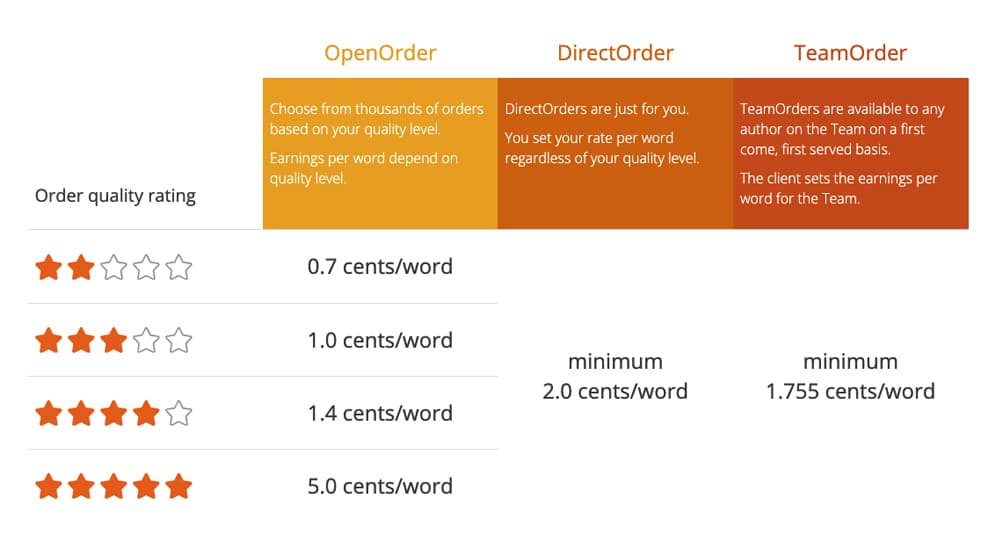
It has a few drawbacks, though.
- Unless your writer strives to write the exact word article count every time – to the point of adjusting sentences to meet it – your precise cost per week/month will vary. It will usually be within a specific budgetary range, but the price will change with every new article.
- A sentence full of fluff and a sentence tightly focused on the subject cost the same. Low-tier writers will fluff up their posts to get paid for less effort on their parts.
- Additional Services. Do you want the writer to research, publish through your CMS, and find and use images? You'll have to negotiate additional fees for those services.
I'll talk more about this model throughout this post since it's the article's subject as a whole. For now, suffice to say that it's ubiquitous in this industry, though not always the best.
Price Per Project
The second option, which is very common amongst mid-tier and high-tier freelancers, is a price-per-project model, and it's also prevalent in the publishing industry. For example, novelists get paid per project at a flat rate, with an advance and a cut of profits from their future sales.
Pricing per project has some advantages, like stability. You know that, say, a given blog post will cost you $200 every time you order one, regardless of subject, exact word count, or complexity. These predictable flat fees can be good for both businesses and writers, who value consistency.
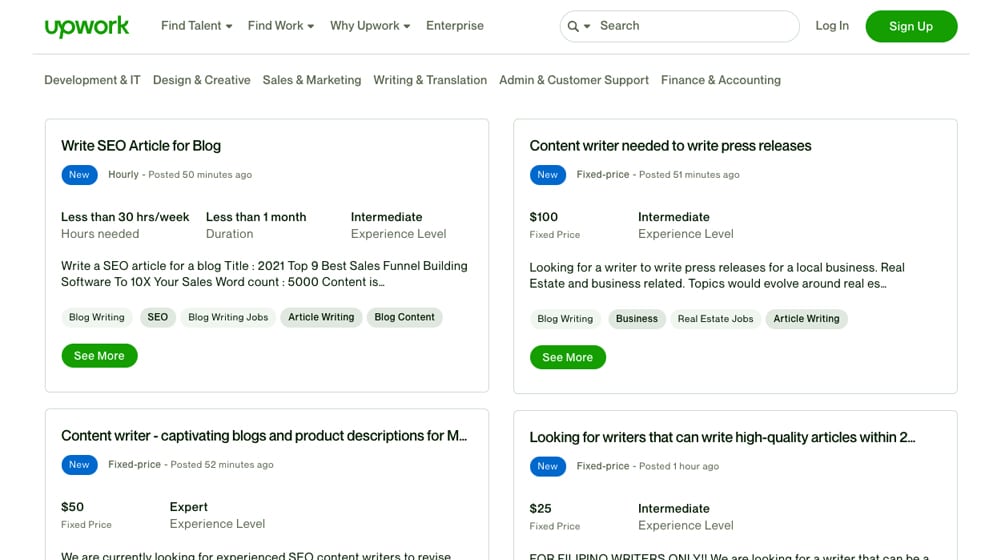
On the other hand, the price per project cannot include additional services, like research/images/publishing. It depends on whether you're hiring the writer to write copy or manage content, and one will be somewhat more expensive than the other.
Price Per Hour
A per-hour rate is familiar with some types of freelancing but not with others. In the world of blogging and copywriting, a per-hour rate is typically seen with freelancers who do more than just content writing. If they're doing research, finding and editing images, handling publication, handling promotion, monitoring analytics - all of that requires money, and the easiest way to charge for it is a per-hour rate.
A per-hour rate can be more expensive (or less expensive) than comparable services in other pricing plans. Freelance writer rates vary a lot and depend on their efficiency, the services rendered, and more. I often find that it's more expensive, but it changes from freelancer to freelancer.

Whether you decide to hire a part-time or full-time writer, be mindful that there are only so many words of quality content that a person can create in a certain amount of time. Depending on the type of content, a single blog post can take an entire day, and a whitepaper could take a full week. As an extreme example, a large eBook can take months to finish. Hiring a writer by the hour doesn't necessarily mean you can squeeze as much as possible out of them and maintain a high level of quality.
Retainer Pricing
Retainer pricing is the ultimate in stability but runs into other problems. Essentially, you pay your freelancer a fixed fee each week/month, and they render services as needed. Sometimes that might be 10 hours' worth of work; sometimes, it might be 30. If the work adds up too much, the freelancer might want to negotiate a higher rate to better compensate them for the work they're doing. Or, you may just end up with a large invoice at the end of the month for your entire content calendar.
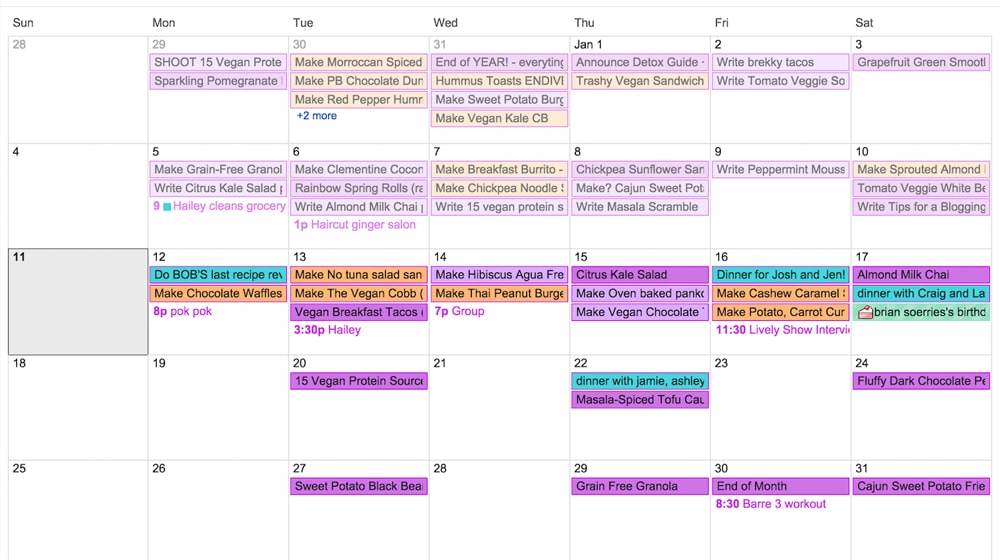
The biggest issue with this is that it becomes very similar to a salaried position. In that case, you can run into labor laws that require you to classify them as an employee rather than a freelancer, with all the details that entail, like benefits and other labor laws.
On the other hand, you might pay them a fixed monthly fee for a set amount of work, like when you're contracting a content marketing agency. Then you're simply hiring an outside firm to handle outsourcing your content marketing.
Is one of these models better than the others? Not really. They all exist because there are use cases for them, and it all depends on the services you need and the individuals or companies offering them.
Good, Fast, Cheap: Pick Two
There's common wisdom in commerce that there are three qualities every service can have: it can be good, it can be fast, and it can be cheap.
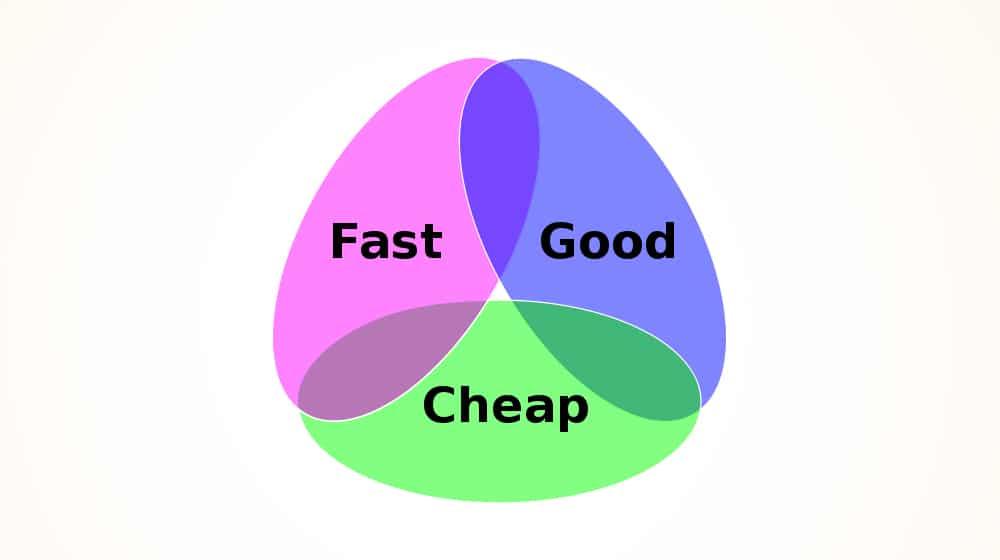
You can never get all three; you have to pick two.
- Good, fast work won't be cheap.
- Good, cheap work won't be fast.
- Fast, cheap work won't be good.
This saying became popular because work requires investment. You can invest in either time or money. You can get good work for a low rate if you don't have time constraints. You can get good work fast if you have the money to spend on prioritizing it. And, if you don't want to invest time or money, you can get work, but it won't be good.
I have to bring this up because one of the pitfalls of per-word pricing is very little reinforcement of this triangle. Per-word rates can be below-average and will still give you great content if you give the freelance writer time to make it. However, the writer gets paid the same amount whether they give you their project in a day or a month.
From the writer's perspective, they have to balance their work with numerous clients, prioritizing the projects with the best effort-to-return ratio. If your project is very complex, and someone else's is simple, they'll write the straightforward content first. You have to wait simply because someone else is asking for less.
This scenario can even vary from week to week, and different volumes of work at various times change the equation for the freelance writer. They also have to consider longevity; if they go above and beyond to work with you, are you more likely to stick with them for years, or do they suspect you're only in it for a few weeks or months? They'll usually prioritize consistent work over valuable work because it eliminates a significant source of stress for a freelancer.
The Broad Range of Per-Word Prices
If you spend any time looking for a freelance content writer online, you'll see a large variety of freelance writing rates, from a penny per word to $1.50 per word or more.
Let's dig into each of the different rates and pricing tiers and what you can expect from them:
Low-Tier
At the cheapest level, you can find writers offering their services for $0.01 to $0.03 per word.

These writers typically fall into one of a few categories.
- For such a low price rate, it's barely worth spending time looking into a topic. These writers will Google the subject, find content that suits, run it through an article spinner or quickly rewrite it and send it over. This is especially common with gigs on freelance writing businesses, content mills, and other affordable writing services.
- At such a low price, it's entirely possible that the freelance writer finds content out in the wild, copies and pastes it for you, and calls it a day. You aren't paying enough for original thought, after all.
- ESL/Foreign. Sometimes a writer lives in a region where the cost of living is so low that they can charge a low fee and still make a decent living. In many cases, the writers are often not entirely familiar with the language you want them to write in and might produce sub-par content. Grammatical errors, typos, and funky-sounding paragraphs could kill your rankings.
- Poor Quality. Good, Fast, Cheap; you've picked Cheap. Good is relative.
- You'll rarely find a good blogger toiling away for sub-par rates. It's possible, of course, but it's hard to say how long that situation will last and if they'll remain reliable.
These situations are, of course, usually why it's better to avoid these price ranges when creating writing jobs. Sure, you might find a diamond in the rough, but you'll have to dig through a lot of freelance writers to get one, and it's not worth the time, effort, or energy to sort through. These are mostly brand new writers or individuals who speak English as a second language.
Quality articles can take days to write when you factor in research, graphic design, editing, formatting, optimizing, and other critical steps.
Middle-Tier
A somewhat higher level price rate is around $0.05 to $0.20 per word. This rate is middle-to-high-end content mill writing, the kind of content you see at the 4-5-star level on sites like Writer Access or Upwork, and the quality you'll find in private teams and curated love lists. It's uncommon to find any quality assignments on most of these websites, as most open assignments are 500-word articles on average or occasional 1,000-word articles.
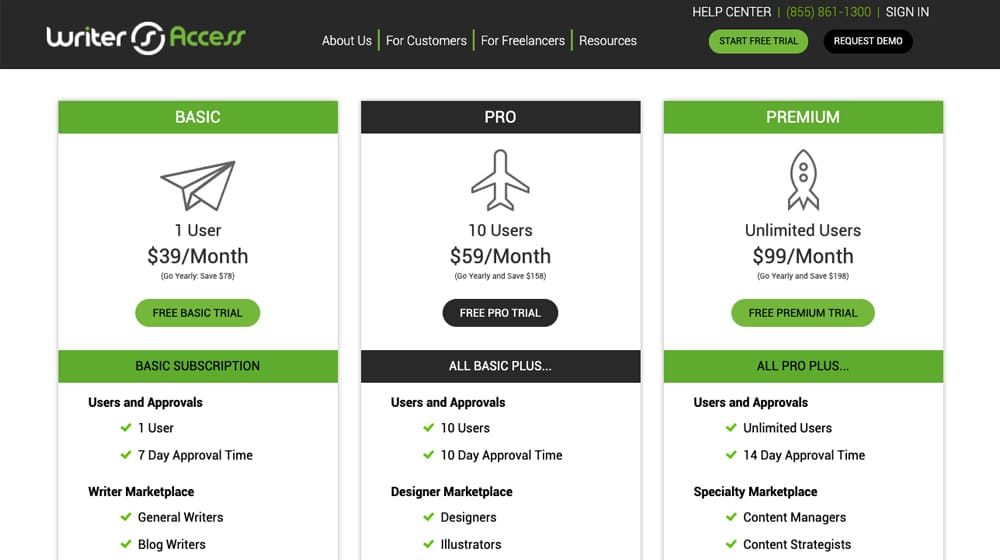
This rate range is also the rate for freelancers who are confident in their skills, produce decent content, and either lack confidence or lack a client list.
Remember that if you're going through a content mill, the freelance writer is getting paid less than you're paying. The mill takes their cut, after all. They do provide a service – they protect you from bad writers, protect writers from bad clients, and do copyright checks – but if you can handle that on your own, a content mill isn't worth it.
Working with a freelancer directly when they charge this much is the peak of the bell curve, where the majority of businesses and freelancers work. It's a reasonable rate and a natural balance between price and quality.
High-Tier
The higher tiers of freelancing are all over the place. There are experienced writers out there working for high rates between $0.25 to $1.50 per word, and that's an extensive price range. The quality between those ranges could vary drastically, or not at all.

This range is hard to generalize because there aren't many writers capable of producing content at this price point. More out there think that their writing skills place them in this category, but it's very uncommon, and they don't have a lot of success with repeat clients. Plus, the writers genuinely worth this price are hard to find because they tend to find a stable client or a writing career and roll with it. They don't actively seek more work because they don't necessarily have to.
These top-tier writers usually have personal blogs of their own, and they may be industry authorities and icons themselves. At that point, you're barely hiring them as writers; your pay rate is a consulting fee to produce content for you.
These writers do a lot more than write, too, of course. They do SEO work, social media marketing, and email marketing, they can promote content with their audiences, and they do everything required for your content to succeed with little to no revisions. They usually have a wide range of high-profile clients, years of writing experience, and their articles are very successful. They're worth every penny, but they don't come cheap, and you'll never have to worry about proofreading.
Traps and Pitfalls
When hiring a freelance writer to handle your blog, you have a lot to think about.
One of the most common mistakes I see people make is when they cheap out on services. You have a small budget and want to conserve it, so you hire writers for low prices.
This practice is a mistake because it's going to get you nothing. Sure, you'll get writing, but is the writing any good? Or is it absolute surface level, bare-minimum kind of stuff? Does it have any focus on SEO, any deep research? Probably not.

When you under-pay for content, you lose out on:
- You're not paying the writer enough for them to think about what they're writing or perform the necessary research. It might be information off the top of their head or thin surface-level content that doesn't satisfy your visitor's search query.
- A writer who is an expert in a subject is going to charge expert rates. Everyone else is just parroting Google search results.
- Additional services. Promotion, research, SEO, images, fact-checking; all of these are services that you don't get when you pay a low rate.
Remember, writing is just part of the content marketing process; marketing is the other half. User experience, CRO, and SEO are equally important, and if somebody isn't doing those things, then your content won't perform as well as it should.
That is, a shotgun filled with birdshot fills the air in a given zone with pellets, increasing the likelihood that at least one of them will hit a flying bird. The bird is small and fragile, so only one shot needs to hit.
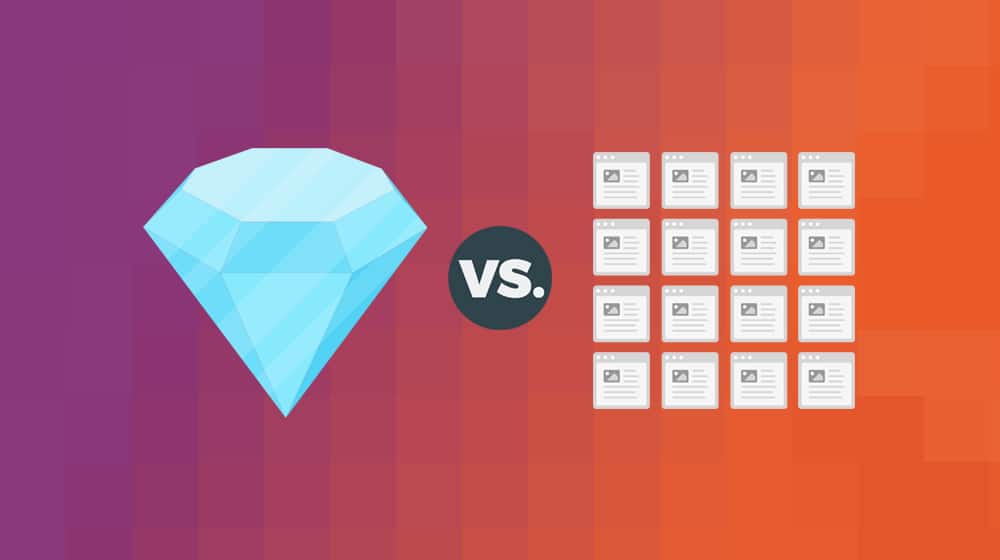
In blogging, the concept then becomes, the more blog posts you have published and produced, the more likely one is to hit an audience and go viral. This strategy is how sites like HuffPo and Buzzfeed got their start.
The problem is that the less investment each post has, the smaller the pellet and the broader the area it must fill. The overwhelming majority of businesses cannot afford to fill the air with enough pellets to succeed. They try to hire cheap freelance writers to produce new posts every day, and it just doesn't work.
What works much better is condensing that budget into single shots, with the time taken to aim. A single shot with one hit, that's all you need. It's more expensive per post, but you only need one post weekly; the frequency isn't that important.
Write Right
I strongly encourage everyone to invest in high-quality writing, especially when your writer is ghostwriting your content and your name and face are on it.
You want that "Good" in the "Good Fast Cheap" triad at all costs, and it's up to you to balance whether you're investing in it with time or money. I recommend money. If you invest money into blogging and start slow, once your blog begins to bring in returns, you can reinvest those returns in ramping up your blog. It's harder to do that the other way around.










January 27, 2022
Thank you! This gives me a good idea of how much I should budget for this. I definitely agree that investing in high-quality writing is a must.
January 28, 2022
Thanks, Bryce! I'm happy this was useful to you. Good luck with your hire!
September 09, 2022
Hi! Are blog writing rates different from say, writing an instruction manual? I found this content very useful by the way, thank you!
October 07, 2022
Hey Cez,
You're welcome!
This is called "technical writing" and it's usualy more expensive than ordinary article writing. I wrote a guide on Technical Writing here:
https://www.contentpowered.com/blog/guide-what-technical-writers/
December 03, 2022
This is very helpful and insightful. How we can find long term clients who can pay us well!
December 05, 2022
Thanks Monika!
My best advice is to apply to jobs on job boards, write cover letters, and do a great job for those clients.
After picking up a handful of different clients you'll find that some are more stable and like your work better than the rest, and you can focus your efforts more on your best clients.
Good luck!